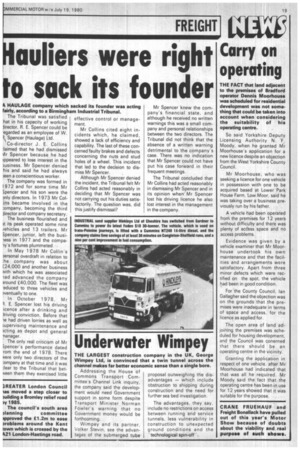Hauliers were right to sack its founder
Page 21

If you've noticed an error in this article please click here to report it so we can fix it.
A HAULAGE company which sacked its founder was acting fairly, according to a Birmingham industrial Tribunal.
The Tribunal was satisfied :hat in his capacity of working iirector, R. E. Spencer could be -egarded as an employee of W. R. Spencer (Haulage) Ltd.
Co-director J. E. Collins ;Ialmed that he had dismissed Vlr Spencer because he had ippeared to lose interest in the pusiness. Mr Spencer denied his and said he had always )een a conscientious worker.
The company was formed in 1972 and for some time Mr 3pencer and his son were the Prily directors. In 1973 Mr Colins became involved in the I:ornpany, becoming the third Jirector and company secretary
The business flourished and t its peak operated some nine rehicles and 13 trailers. Mr Spencer, junior, left the busiless in 1977 and the compa'ay's fortunes plummeted.
In May 1978 Mr Collins Personal overdraft in relation to he company was about £24,000 and another business ,vith which he was associated lad advanced the company around £40,000. The fleet was 'educed to three vehicles and ?ventually to one.
In October 1978, Mr R. E. Spencer lost his driving icence after a drinking and Jriving conviction. Before that le had driven lorries as well as 3upervising maintenance and acting as depot and general nanager.
The only real criticism of Mr Spencer's performance dated rom the end of 1978. There were only two directors of the ompany at that time and it was :lear to the Tribunal that between them they exercised little effective control or management.
Mr Collins cited eight incidents which, he claimed, showed a lack of efficiency and capability. The last of these concerned faulty brakes and defects concerning the nuts and stud holes of a wheel. This incident that led to the decision to dismiss Mr Spencer.
Although Mr Spencer denied the incident, the Tribunal felt Mr Collins had acted reasonably in deciding that Mr Spencer was not carrying out his duties satisfactorily. The question was, did this justify dismissal? Mr Spencer knew the company's financial state, and although he received no written warnings this was a small company and personal relationships between the two directors. The Tribunal did not think that the absence of a written warning detrimental to the company's case. There was no indication that Mr Spencer could not have put his case forward in their frequent meetings.
The Tribunal concluded that Mr Collins had acted reasonably in dismissing Mr Spencer and in its opinion when Mr Spencer lost his driving licence he also lost interest in the management in the company.








































































































































